- Home
- Beryl Kingston
A Time to Love Page 8
A Time to Love Read online
Page 8
He was still trying to puzzle it out when he drifted off to sleep for the third time that night.
During the next few days the speed of street games and the pounding of rote learning left him little time or energy for perplexing thoughts. His father was the same as always and Alfie was hidden behind the big boys’ wall, so he forgot the puzzle he couldn’t solve and went back to enjoying his life one day at a time.
But then late one Friday afternoon, just before Shabbas, when he’d gone to Thrawl Street with Aunty Dumpling’s little dish for a ha’p’orth of jam, Boss-eyes suddenly barred his way.
‘’Ang about kid,’ he ordered. ‘How d’yer like to earn another tanner?’ He was stooping so that his face was immediately in front of David’s, but he didn’t seem to be looking at him, not even with one of his flickering eyes.
‘Vell …’ David said, anxiety and doubt returning, ‘I don’t know.’
‘Worf yer while,’ Boss-eyes said. ‘Tell yer what. Make it eightpence this time. Whatcher say?’
Eightpence was a very tempting offer, and perhaps he’d been wrong about this man. It was hard to tell if a person was honest when they couldn’t look you in the eye. He should ask him maybe. It wouldn’t hurt to ask. But that might make him cross, and then again it was very nearly Shabbas, and there wouldn’t be time for a long conversation because he had to be home before dusk. It was very difficult …
‘Whatcher say?’ Boss-eyes insisted. He was such a very big man and the width of his body was making David feel intimidated.
‘All right,’ he said and was annoyed at himself because he hadn’t asked after all, and he was almost certain it was wrong.
He was so deep in his thoughts he didn’t notice Ellie Murphy who was crouched on the steps of the Frying Pan waiting for her father to come out and give her some money for the family supper. But she saw him.
‘You’re a mug!’ she said, getting up from the step and walking towards him.
‘None a’ your business,’ he answered. Trust Smelly Ellie to put her oar in.
She strolled round his averted body until they were face to face. ‘You’ll end up in quod, you work fer ’im,’ she warned. ‘’E’s a crook.’
‘’E ain’t.’
‘End up in quod,’ she repeated, nodding wisely.
The nod infuriated him. It was nothing to do with her, and she was horribly dirty this evening, her hands more black grease than flesh, and her hair matted and dusty. ‘Push off, Smelly!’ he said, glad that his father was nowhere near to hear him being so rude to a girl.
‘That’s a mug’s game, that ol’ ring trick,’ she said, not a bit abashed. ‘We ’ad a bloke up the Flowery used ter work it oncest. ’E got five years. You wanna watch out.’
‘Five years in prison?’ he said, colouring. She was making him feel afraid now as well as angry. Why couldn’t she mind her own business?
‘They’ll do you an’ all, you go along wi’ that lot. You ain’t got much sense, ’ave yer?’
‘I’m earnin’ money fer my Ma,’ he said proudly, his mouth set and determined because she was making him feel used and foolish now, and he had to try to redress the balance.
‘You’re a mug, Davey Cheifitz. They’ve took you fer a ride. An M-U-G.’ She was grinning at him, enjoying his misery, beginning to skip and chant, ‘Muggy muggy Cheifitz!’ Horrible hateful girl!
‘I vould rather be mug than thief,’ he said. ‘You are thief. I seen yer.’
‘No you never.’
‘I did. You vas nickin’ apples in the Lane. I seen yer.’
She gave him a look of withering scorn. ‘Oh do me a favour,’ she said. ‘That ain’t nickin’.’ How else was she supposed to eat if she didn’t help herself to food? ‘You was workin’ a con trick and you don’t even know it. Brass them rings are. Tuppence ha’penny a dozen. They buy ’em wholesale. Brass!’
‘No they ain’t!’
‘They are.’
‘They give me five bob. Fer a gold ring. Gold!’
‘Yours was gold. That’s the trick. All them others was brass. You’re a mug, Davey Cheifitz! You’ve been ’ad!’
He ran at her, fists raised as if to strike her, ‘Shut your face, you!’ as though she was a boy. How dare she tell him things like that? Especially when he knew they were true. But she ducked out of the way behind the thick shawl and wide skirts of a passing street seller, emerging on the other side to chant again. ‘Oh-oh, ‘it girls, do yer?’
‘No!’ he yelled at her. ‘I don’t.’
‘Cowardy cowardy custard!’
‘I ain’t!’
‘Y’are!’
People were beginning to look at him, but he was too far gone in rage to care. He was angry at her for taunting him and criticizing him and daring to tell him the truth; and he was angry at Mr Crusher and Boss-eyes for exploiting him and making him feel shamed and feeble; and he was angry at himself for being so weak-willed and so stupid, because she was right, he had been taken for a ride.
‘Push off!’ he yelled at her, backing away, because he was going to cry and he didn’t want her to see.
‘Cry baby cry!’ she jeered, following him to press home her advantage. ‘Stick yer finger in yer eye, an’ cry baby cry!’
He ran from her, tears welling from his eyes, and he ran headlong, because he knew if he stayed anywhere near her he would hit her. He wouldn’t be able to stop himself. He was so hot with anger and shame he had to hit something, and if she was in the way it would be her, he knew it. His outstretched hands touched the wall of Mrs Levy’s shop, and at that his anger exploded and he pummelled the brick with his fists until his knuckles were torn, sobbing aloud in an extremity of fury and anguish.
‘Great stupid baby!’ her voice said disparagingly behind him.
He turned, tear-streaked and furious so that they were face to dirty face. ‘I hate you!’ he said.
Even that didn’t put her off. ‘See if I care!’ she said, and walked away into the crowds, her spine poker straight and her tatty head held high. Horrible, horrible girl.
The minute he was sure she couldn’t see him he began to run home, tear-stained and blood smeared and aching for comfort.
Chapter Six
Ellie Murphy was cross and upset too but, unlike David, she didn’t run home for comfort, because hers wasn’t the sort of home anybody would run to for anything. In fact she spent quite a lot of her time planning the day when she would run away from it. Now she walked towards it slowly and with dignity, her skirt swinging against her legs and the ostrich feathers on her black straw hat bouncing jauntily behind her.
She knew she was poor and dirty and that the other kids poked fun at her and despised her, but that was no reason to give in. She’d known all her short life that the only way to survive was to fight back, and if you couldn’t fight back openly and physically, you fought inside your head. One day, when she was grown up, she would fight her way out of Whitechapel, and right away from her parents too. When she was grown up and she’d ‘bettered herself. She wasn’t quite sure what you had to do to better yourself, but she knew she wanted to do it, whatever it was. For she’d seen girls who’d bettered themselves, and she knew that they dressed in stylish clothes and rode about in carriages and always had plenty to eat. Like Mrs Quinton’s daughter, who came back to Wentworth Street twice a year, like a lady. One day, she’d be just like that. No matter what happened to her, she wouldn’t let them grind her down. She’d fight her way out. Just see if she wouldn’t!
Now as she strode through the crowds in Commercial Street pushing past barrows and swaying her skinny body away from loaded baskets and crunching feet, she was thinking furiously. That Davey Cheifitz was a stupid great baby. The idea, calling her a thief! How else would she get fed if she didn’t nick things? It was all very well for boobies like him, with aunts to make cakes for ’em and meals all set out nice with a plate for everybody. Oh, she knew. She’d seen it at Ruby Miller’s house. All nice and easy for them it was. Sh
e had to make shift for herself, because it wasn’t like that in Dorset Street.
Dorset Street was a terrible place to live. Worse than the Flowery and that was bad enough. Jack the Ripper had killed two of his victims there, so Ma said, one at No 35 and the other in Miller’s Court, right next door to Mrs Fahey’s lodging house, where they’d all been for the last six months. And the cops had never caught him. He could start up again any time, Mrs Fahey said. It was enough to make yer flesh creep just thinking about it. She wished they’d hurry up and move on somewhere else. She knew they weren’t paying the rent. She’d heard Mrs Fahey asking her mother for it only yesterday. So they’d probably get kicked out pretty soon, or do a moonlight.
In the middle of Commercial Street Ellie had to stop and wait while three trams rattled past, their open top decks crowded with well-dressed passengers, bonnets nodding at bowlers and top hats like chimneys. Her anger faded as she waited, because she could see the corner of Dorset Street from where she stood and the mere sight of it was enough to bring her down from any emotion. By the time she reached the Britannia beerhouse on the corner, her shoulders were drooping with resignation.
Everything about this street was sordid and ugly. The buildings rose forbiddingly from pavements so broken and dirty they looked more like earth paths than paving stones, and a rank black earth at that, and there were kids everywhere, boys kicking and fighting, infants crawling and squalling, and skinny girls bent sideways by the weight of the huge babies they carried on their hips. ‘’Lo Ellie,’ they said as she passed. ‘Your Ma’s been lookin’ out fer you.’
She didn’t doubt it. Her Ma was always looking out for her, and always for the same reason. She wanted her to look after the babies, and clean their dirty bums, and lug them about with her, and joggle them to sleep when they grizzled. That was an older daughter’s lot in Dorset Street and although she did it, to help her mother who was always harassed, she hated it and resented it, especially when her father came home drunk and knocked them all about.
She dodged past the two slatternly women who were lolling against the doorpost, smoking their pipes, and ducked into Mrs Fahey’s greasy hall. There was another woman asleep on the stairs, sprawled on her back with her mouth wide open and her neck and cheeks a dull ugly red. Ellie recognized a drunk when she saw one, and stepped round her on tiptoe, careful not to touch her or disturb her in any way. She might not be very good at sums and reading but she knew exactly how to cope with life in Dorset Street
Her mother was making matchboxes, working with nervous speed and a great economy of movement, folding the fragile boxes with her left hand, flicking the glue brush to right and left, pinching the edges together for a sticky second between thumb and forefinger, fold, flick, pinch, fold, flick, pinch, like a machine. Her face was empty with concentration, and she was surrounded by flies which crawled up the window and the glue-splashed curtain, and circled her head and hands, avid for the paste. The bigger of her two current babies, two-year-old Frankie, was hammering her knees with his fists and screaming for attention, and the smaller, baby Teresa, who was seventeen months old, was busy eating the crushed remains of a box that hadn’t stuck properly, but her mother paid no attention to either of them, and didn’t even look up from her work when Ellie came in.
In her youth she’d been considered a beauty, a slim, long-legged creature, with thick dark hair, and fine blue eyes ‘set in with sooty fingers’. When she first married Paddy Murphy people said they made a really handsome couple, good Catholics both, he so broad-shouldered and wide of face, with a shock of thick brown hair and bland blue eyes and the look of boy, even though he was turned thirty-five, she so petite and feminine beside him. But now their beauty was gone. Drink had removed most of his teeth and thinned his hair and mottled his face with purple. Poverty and incessant pregnancy and the demands of too many children had ruined her. Although she was only twenty-six, her skin was sallow and her teeth bad and all her lissom shapeliness forgotten. Occasionally she would look at young Ellie and wonder if she would grow up to be a beauty too, but for most of her time she was too busy struggling for an existence to think about anything else. Tuppence a gross was the going rate for matchboxes and it took her the best part of a day to earn it.
‘Pick our Frankie up, Ellie, will yer?’ she said mildly. ‘See if you can find sommink ter pacify him. Sommink little fer ’im ter suck.’
It was easier said than done, for there wasn’t very much available in their squalid room. Only dirty cups and plates, and the two beds and a collection of orange boxes that served first as chairs and cupboards and then as firewood. And the sack full of matchboxes, of course. Ellie knew that what the kid wanted was something to eat, but there was no food for any of them yet. Food was bought in ha’p’orths and pinches when they could afford it, and only her mother’s meagre earnings were really dependable. When the matchboxes were finished she’d be sent to buy bread and marg and a pinch of tea. Until then she’d have to find something else.
Frankie didn’t make things easy for her. When she bent to pick him up he threw up his arms and arched his back against her, resisting with all his force, which was considerable, for he was a big boy with his father’s heavy bones. She held his stiff screaming body slung across her hip and rummaged about in the tin pail until she found a spoon for him to suck. His trousers were soaking wet and he was even grubbier than she was, but she had long grown immune to carrying damp smelly babies about. It was the natural condition of infants in the Murphy household, and at least it dried in time and didn’t have to be wiped off and burnt in the fire like shit.
‘On’y another dozen, then I done the gross,’ her mother said, flicking and sticking. ‘See if they’re stuck sufficient ter pack, there’s a good gel.’
Ellie set her spoon-sucking brother on the floor and sat on her haunches between him and the pile of finished boxes so that she could test them with her fingers, and he couldn’t touch them. Some of them were still quite tacky. ‘Not quite,’ she was saying when Mrs O’Leary came running in from the next room, wild hair flying.
‘Mrs Murphy!’ she yelled. ‘Look sharp an’ clear the room for the love of God. Here’s your Patrick out in the street. brawling so he is, an’ Amy says he’s broke her father’s head, an’ the pair o’ them drunk as lords. Saints preserve us! What’ll he say when he sees the state of this room?’
It was a rhetorical question for they all knew what he would say and, even worse, they’d all seen what he could do, particularly when he was roaring drunk. Ellie had the sack open at once. Tacky or not, the boxes had to be under the bed and out of sight before he got up the stairs.
They worked quickly and together, saying little and thinking fast. But the glue was still on the table and at least a dozen boxes still on the floor when they heard him crashing up the stairs and shouting at the drunken woman, ‘Shift your ogly carcase out uv me way, woman!’
Mrs O’Leary departed as swiftly as she’d arrived and Ellie crawled under the bed, scooping the sack and the remaining boxes after her.
‘Where are me darlin’ boyohs?’ he roared, lurching into the room, arms outstretched, and with his two filthy mongrels at his heels. ‘Let me see ’em. Patrick! Seamus! Come to your Dadda. A finer pair a’ boyohs the good Lord never did create. An’ I challenge onyone to call me a liar.’ Then as he couldn’t see his two favourites, despite the most determined effort to focus his eyes, his tone became truculent. ‘What’ve you done wid me boys, woman?’
Mrs Murphy slid the glue pot onto the recess shelf and brushed the table clear of matchbox splinters, her hands quick and nervous. ‘Don’t start all on at me,’ she said, and fear made her voice sharp. ‘They’ll be out street-rakin’ most like.’
‘No son of mine should be out in the street when his Dadda comes home,’ her husband roared and aimed a blow at his two howling infants, fortunately missing them both. ‘Hold your noise, will ye!’
The two dogs flung themselves down beside the stove, panting. The air
in the room was more rank than ever, with the smell of their dirty fur and their master’s beer-laden sweat added to the stink of fish glue and stale piss. Frankie began to cry again. ‘Ma! Ma! Ma!’ in his incessant deafening way. Pick ’im up quick, Ellie thought, or it’ll put Pa in a paddy, sure as fate. But her father was already in a paddy because he’d seen the glue pot.
‘Woman!’ he roared. ‘Have I not told ye? Have I not made mesself abondantly clear in this matter? I will not tolerate clotter in me home. A man’s home is his castle, so it is. I’ve a right fer to be obeyed in me own home, and not to come in when I’m weary wi’ work and find fish glue all over me table. Clear it from me sight, d’ye hear. ’Tis an abhorrence to me.’
‘There you are! It’s all hidden away,’ her mother cajolled. ‘All nice an’ tidy. Now you jest sit on the bed an’ let me take yer boots off. You’ll feel all the better for yer boots off.’ She spoke placatingly as if he were a fractious child, and the wheedling note in her voice annoyed her daughter, crouched in her dusty sanctum under the bed.
‘An’ so I should think,’ her father growled, sitting on the bed so suddenly and violently that the springs sagged until they touched her shoulders. ‘How mony more times have I to tell ye? I can’t abide this work ye do. Can’t abide it, y’onderstand. Ye’ve ter stop it at once, or I shall know the reason why.’

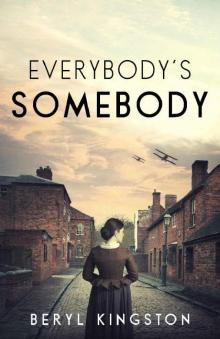 Everybody's Somebody
Everybody's Somebody Sixpenny Stalls
Sixpenny Stalls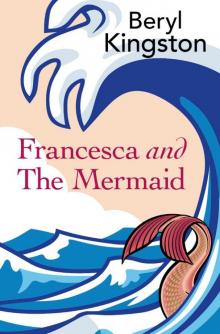 Francesca and the Mermaid
Francesca and the Mermaid Avalanche of Daisies
Avalanche of Daisies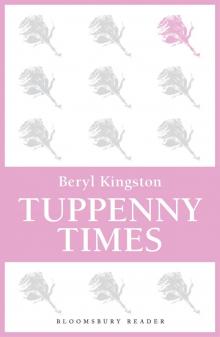 Tuppenny Times
Tuppenny Times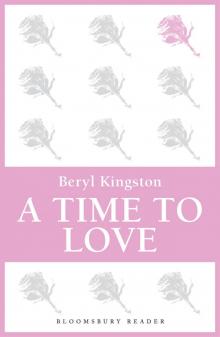 A Time to Love
A Time to Love Octavia's War
Octavia's War Gemma's Journey
Gemma's Journey London Pride
London Pride Gates of Paradise
Gates of Paradise Octavia
Octavia Off the Rails
Off the Rails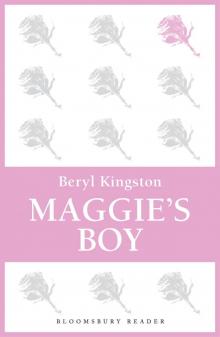 Maggie's Boy
Maggie's Boy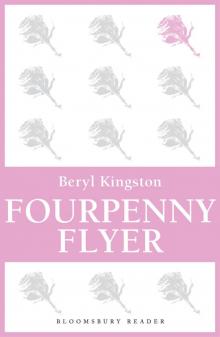 Fourpenny Flyer
Fourpenny Flyer